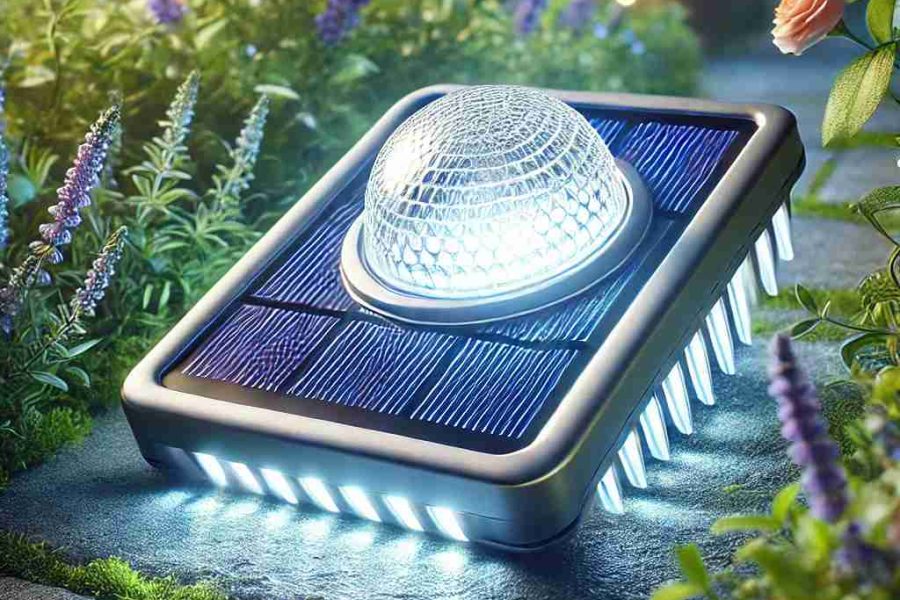The emergence of solar-powered smart homes is changing our perspective on energy use and home automation. These residences effectively combine solar energy systems with smart technology, resulting in highly efficient, sustainable, and future-oriented living spaces. By utilizing solar power alongside intelligent devices, solar-powered smart homes provide numerous advantages that extend beyond mere energy savings. Let’s explore how these homes are redefining modern living.

What Exactly Are Solar-Powered Smart Homes?
A solar-powered smart home is a dwelling that primarily relies on solar energy while incorporating smart home technologies to enhance energy efficiency. These homes are equipped with solar panels on the roof to generate electricity, along with smart devices like thermostats, lighting, security systems, and appliances, all designed to optimize energy usage.
Beyond the basic setup, these homes frequently include energy storage solutions, such as solar batteries, which store surplus energy produced during the day for use at night or during peak demand times when solar generation is lower.
Key Benefits of Solar-Powered Smart Homes
Sustainability and Eco-Friendly Living
Solar energy is clean, renewable, and helps decrease reliance on fossil fuels. By adopting a solar-powered smart home, homeowners can greatly lower their carbon footprint and play a part in the global initiative to fight climate change. Solar panels capture sunlight, and the integration of smart technologies guarantees that every watt of energy is utilized effectively.
Cost Efficiency and Savings
One of the most noticeable advantages of solar-powered smart homes is the significant drop in utility bills. Solar panels produce free electricity, and with an intelligent energy management system, any surplus power can be stored for future use or sold back to the grid, further reducing expenses. Smart devices, like energy-efficient lighting and heating, automatically adjust according to usage patterns, ensuring that energy is not wasted.
Eliminate Electricity Bills: Depending on the size of the system and the homeowner’s energy needs, solar energy can generate enough power to completely eliminate monthly electricity bills.
Government Incentives: Numerous governments provide rebates, tax credits, and incentives for homeowners who install solar energy systems, making it a more affordable option over time.
Convenience and Control
In a solar-powered smart home, everything is easily accessible. With smart home systems, you can manage lighting, appliances, security, and even temperature from anywhere using your smartphone, tablet, or voice assistant.
Smart Lighting: Lights can automatically turn on or off based on room occupancy or the time of day. Some systems even adjust lighting according to the available natural daylight, enhancing energy efficiency.
Temperature Regulation: Smart thermostats adapt to your preferences and modify heating and cooling systems to optimize energy use, ensuring comfort without unnecessary waste.
Security Systems: Solar-powered smart security cameras and alarms operate independently of the grid, offering a sustainable, 24/7 security solution for your home.
Energy Independence and Reliability
Solar-powered smart homes help homeowners reduce their dependence on the grid, promoting greater energy independence. By utilizing solar batteries, any surplus energy generated during the day can be stored for use at night or during power outages, ensuring a steady power supply.
Backup Power: Solar battery storage systems, like the Tesla Powerwall, capture energy produced during the day, allowing the home to remain operational even when the grid is down.
Grid Independence: With solar energy, homes are less affected by rising utility costs and power outages that can occur due to grid instability or severe weather conditions.
How Technology Powers Solar Smart Homes
Smart Inverters: Solar inverters transform the DC power generated by solar panels into usable AC power for the home. Some of these inverters are smart inverters, which integrate with the home’s energy management system, offering real-time insights into energy production and consumption.
Energy Management Systems (EMS): These systems automatically adjust energy usage based on real-time consumption and solar production. They prioritize energy-efficient devices and can turn non-essential appliances on or off as needed to save energy.
Battery Storage Systems: Solar batteries store excess solar energy during sunny periods for later use. This helps reduce reliance on the grid during peak demand times, such as at night or during outages.
Smart Appliances: Modern appliances, from refrigerators to washing machines, can be optimized for solar energy. Some can even schedule their operations during peak solar generation times, ensuring they operate on renewable energy.
Real-Life Applications of Solar Smart Homes
Solar-Powered Lighting
Solar-powered lighting systems can be set up throughout the home, including garden lights, exterior lights, and even indoor fixtures. These lights automatically adjust based on ambient light conditions, ensuring maximum efficiency.
Climate Control
Smart thermostats manage the home’s temperature according to the homeowner’s preferences.
Why Solar-Powered Smart Homes Are the Future of Modern Living
Solar-powered smart homes are paving the way for sustainable living. With ongoing advancements in technology, these homes are set to become increasingly efficient, affordable, and user-friendly. By utilizing solar energy and integrating smart technologies to manage energy use, homeowners can foster a more sustainable, cost-effective, and comfortable living space.
In conclusion, embracing solar-powered smart home solutions is not only a valuable investment in your property but also a step towards a greener, more energy-efficient future. As the world shifts towards renewable energy, solar-powered smart homes will lead the charge, providing a cleaner, smarter, and more sustainable lifestyle.





